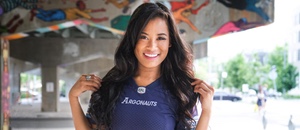The Road to Radio: Rachel Ettinger’s WorkStory
/By Michael Slipenkyj, WorkStory Ambassador at Western University
Most young people begin post-secondary education with some idea of what they want to do for the rest of their lives. But many quickly discover that the career they dreamed of won’t actually be a good fit for them.
Rachel Ettinger is one of these young people. As a horseback rider she dreamed of following her passion for animals with career as a veterinarian. She attended St. Francis Xavier University on a scholarship to study biology, but during her second year, after genetics and botany classes, Rachel realized that she was no longer enjoying biology the way she thought she should be. She then made the difficult decision not to pursue a career as a vet.
While contemplating switching her major to business she talked to one of her professors who explained how she could take her electives and a couple summer classes -- and graduate with a double major resulting in two degrees!
Rachel followed this advice and took all her spare classes in business. After her fourth year she graduated with a Bachelor of Science along with her biology classmates. And after her fifth year she graduated with a Bachelor of Business Administration.
One summer, wanting to stay in Halifax with her friends from school, Rachel got a job working with Virgin Radio Halifax as part of its Summer Cruiser program. A friend- who had previously worked at the Summer Cruiser program - recognized what a good fit Rachel would be for the job and recommended she apply. Rachel loved working for the Cruiser Program as it gave her the opportunity to see a lot of the city, meet new people, and attend many fun events!
Toward the end of the summer, Rachel was offered a job filling in on the morning show at 101.3 The BOUNCE in Halifax. Even though she had little experience as a radio host, she took the opportunity and loved it! By the end of the summer she was offered the job. Valuing her education, she declined the first full-time job offer as the morning show co-host. But after she finished her fifth year at university and graduated with her B.B.A she was again offered the job as the morning co-host at 101.3 The BOUNCE in Halifax. This time, without any hesitation, she took the job.
At first, it was not easy. Rachel began with very little knowledge about how to be a radio and television host. But she did not let the stress bring her down. And, as she looks back on it now, she notes that “In one way it was good, because I didn’t have any bad habits.”
Rachel started off working solely on the radio but, after a couple of months the 2015 World Men’s Curling Championships in Halifax gave Rachel her first television opportunity. Working as the lead correspondent for CTV News, she proved her capabilities and got her foot in the television industry door, so to speak.
Rachel worked in Halifax for a year and a half before being promoted to the morning co-host at 97.5 Virgin Radio in London, Ontario. She doesn’t know where her job will take her next, but she hopes the skills she learns from her current role will help her evolve along with the drastically changing radio and television industry.
Rachel’s advice? While a university degree is not a prerequisite for a career in radio and television, Rachel observes that people with post-secondary education are often successful in their career because “they build certain skills, I believe, through education. They learned how to be on a team and how to do projects together and all those things will help with any job”.
One reason Rachel loves her job is that it’s a great fit -- with both her education and her personality. Her education provided her great life skills on how to handle teams and show up prepared. And her outgoing personality really meshes well with her co-host, Jeff Kelly, making them a relatable duo for their listeners. In Rachel’s own words, “Somewhere in a car, somebody will relate to you, and that’s the entire point”.
Rachel also loves working in the media industry because of the many opportunities it provides. She loves being part of community events and has met many people and made many friends. And these interactions provide her a great way to connect with the people who she is actually trying to speak to on her radio show. While she is by no means the biggest fan of early mornings, Rachel absolutely loves scanning through all the social media, figuring out what’s popular and important, and getting that information to her audience in the morning.
Overall, Rachel loves working in television and radio because it provides her an outlet to communicate issues that she cares about. She loves learning about current issues and telling more people about them. While degrees in biology and business may not seem like ideal path for a radio host, Rachel’s education taught her important life skills which really help her connect with her audience. As Rachel puts it, “It doesn’t really matter what your background is for certain things…it’s based on foundational skills…and getting where you want to go”
Check out Rachel every week day on Mornings with Jeff and Rachel from 5:30am-9:00am on 97.5 Virgin Radio!










